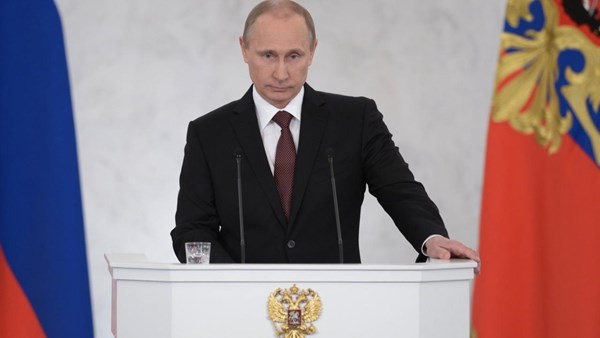Putin proposes extensive changes to Russian constitution
For the first time ever, Putin’s address to the Federal Assembly took place immediately after the New Year’s holidays. During his address, he announced that he was proposing “a number of constitutional changes” which could be the most far-reaching amendments ever made to Russia’s constitution, which was adopted in 1993.
Several hours later, Prime Minister Dmitry Medvedev announced that his cabinet would be resigning, saying that “the government should give the president the opportunity to make all the necessary decisions” in order to implement the points of the address.
As part of his proposed constitutional amendments, Putin suggested that the State Duma be given power to approve the candidate for prime minister, as well as all other deputies and ministers based on the prime minister’s recommendations. The president will not be allowed to reject the approved candidates, although he will retain the right to dismiss them.
The head of state is currently appointed by the president with the Duma’s consent, but ministers are appointed by the president based on the prime minister’s recommendations.
The president will retain direct leadership of the armed forces and the entire law enforcement system. However, he will have to consult the Federation Council on who to appoint as heads of these departments.
Putin emphasized that Russia “cannot grow and exist stably in the form of a parliamentary republic”, and instead should remain a powerful presidential republic.
Among his proposed amendments to the constitution were to turn the State Council into a constitutional organ. “I consider it expedient to enshrine in the constitution the relevant status and role of the State Council,” he said, stressing the need to “radically increase the role of governors in formulating and making decisions on a federal level”.
The State Council was created on Putin’s orders in 2000, and is now a presidential advisory body. The structure is headed by the head of state, and includes the chairpersons of both houses of parliament, the president’s representatives in the federal districts, the regional heads and the leaders of parties in the State Duma. The president can also allow the inclusion of “former governors who have great experience in government and public activity”. In 2018, 16 work groups on prominent topics were created through a presidential order in the context of the State Council.
While the State Duma and Federation Council’s powers were discussed in some detail during the address, no details have yet been(disclosed regarding the status of the State Council, observes political scientist Alexander Pozhalov. The State Council, which currently has no powers, will get them, a source familiar with the discussion of the amendments told RBC. “It’s obvious that being enshrined in the constitution, the State Council cannot have no powers,” he said.
The State Council will become part of the structure of executive government, acting Deputy Prime Minister Vitaly Mutko confirmed to RBC news agency.
The following are Putin’s proposed amendments to the constitution:
1. Granting the State Duma the right to approve the prime minister and other ministers. The president will not be allowed to reject the approved candidates.
2. Prohibiting the prime minister, other ministers and the heads of federal organs, governors, senators, MPs and judges from having foreign citizenship or permanent residency elsewhere.
3. Appointment by the president of the heads of all security departments and regional prosecutors following consultations with the Federation Council.
4. Changing the requirements for presidency: He must have lived in Russia for at least 25 years (currently at least 10 years), most not possess foreign citizenship or permanent residency elsewhere not only at the moment of elections, but at any point beforehand. The constitutional loophole which enabled Putin to have a third term will also be removed from the constitution: “One and the same person may not hold the position of president of the Russian Federation for more than two consecutive terms”. The term “consecutive” will be dropped.
5. To include a new rule in the constitution stipulating that the minimum wage cannot be lower than the subsistence minimum for the working population.
6. The demands of international legislation and treaties, as well as the decisions of international organs, will have effect in Russia only to the extent that they do not entail a restriction of human and citizen rights and freedoms, and do not contravene the constitution.
7. The Constitutional Court will be given the right to request that the president validate the constitutionality of bills before signing them.
8. The Federation Council will be given power, at the president’s recommendation, to dismiss judges from the Constitutional and Supreme Court if they commit offenses which are damaging to honor and dignity, thereby also permanently stripping them of the status of judge.
9. The regular indexation of pensions will be included in the constitution.
By strengthening the powers of several institutes of government, Putin has retained a broad range of possibilities for personal political maneuvering after his presidential term ends.
Putin will sign a separate decree which will determine when and how the voting on the constitutional amendments will take place, his press secretary Dmitry Peskov noted. The matter will be determined through a vote, and not through a referendum, he emphasized, “because the president was talking about matters which do not concern the fundamental articles of the constitution”. The matter “does not actually require any decision-making through voting”, but since it is quite a serious reform, the president has considered it advisable and necessary to consult with citizens in this way, TASS cites Peskov as saying.
